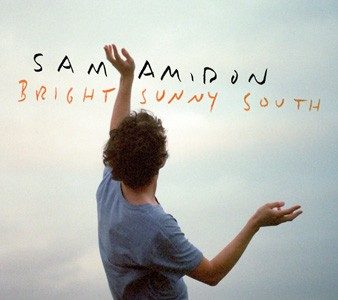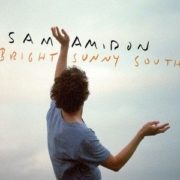SAM AMIDON – BRIGHT SUNNY SOUTH
TITLE: BRIGHT SUNNY SOUTH
ARTIST: SAM AMIDON
LABEL: NONESUCH RECORDS
RELEASE DATE: MAY 22, 2013
 On his fourth studio album, urban folk musician Sam Amidon proves that when stripped bare, an old Southern ballad and a modern R&B hit are essentially one and the same. Expanding his repertory menu beyond the usual ballads and hymns to include renditions of popular Country and R&B hits, Bright Sunny South is perhaps his most mature album to date. Produced with longtime friend Thomas Bartlett (a.k.a. Doveman) and famed engineer, Jerry Boys (Vashti Bunyan, Martin Carthy), these eleven understated arrangements relate old stories to new ones and reveal how Amidon synthesizes the sounds of his urban environment through an organic process of folkloric mimicry.
On his fourth studio album, urban folk musician Sam Amidon proves that when stripped bare, an old Southern ballad and a modern R&B hit are essentially one and the same. Expanding his repertory menu beyond the usual ballads and hymns to include renditions of popular Country and R&B hits, Bright Sunny South is perhaps his most mature album to date. Produced with longtime friend Thomas Bartlett (a.k.a. Doveman) and famed engineer, Jerry Boys (Vashti Bunyan, Martin Carthy), these eleven understated arrangements relate old stories to new ones and reveal how Amidon synthesizes the sounds of his urban environment through an organic process of folkloric mimicry.
Bright Sunny South – contrary to what the title suggests – explores dark, introspective themes of war, death and unrequited love from poignant perspectives of lost and lonely individuals. The variety of songs and styles achieve cohesiveness through Amidon’s claim that the album is an immensely personal one, covering what appears to be the entire spectrum of his musical influences, from Irish fiddle tunes and open fifth Sacred Harp harmonies to free jazz solos and outros. Choosing to revert to the sparseness of his first album, the songs on Bright Sunny South retain the purity and precision of a live performance while still showcasing Amidon’s varied musical influences.
The title track opens with a droning Hammond organ and simple fingerpicking guitar as the story of a young soldier leaving his Southern home to fight in the Civil War unfolds. The Vermont-native delivers this early Southern ballad with the sincerity of one’s own personal history. His plainspoken voice is earnest, making tangible the impending Confederate defeat. Time feels suspended and we the listeners are enticed to savor the young soldier’s final moments with his family. In this first track, we see Amidon at his most contemplative, creating present moments out of events past. On almost every track, Amidon creates a guitar and voice foundation before adding overdubs to retain the spontaneity and rawness of a live recording. At times the musicianship is unassuming and at others the depth of musical prowess is inspiring, but there is never a moment when the recordings feel processed. In As I Roved Out, a shuffling, snare beat accompanies his formidable clawhammer banjo playing while his voice tears and strains in fragmented melismas with uncharacteristic wantonness, the message of a broken heart barely discernible behind the onslaught of youthful angst.
Understatements and juxtapositions dictate the emotional content left and right in Bright Sunny South. I Wish, I Wish is a lament for a stillborn child contrasted by a soothing melody with carefree polyrhythms. Only with the addition of a searing trumpet melody – performed by veteran jazz trumpeter and friend of Amidon’s, Kenny Wheeler – is the repressed grief of the childless mother made apparent. He’s Taken My Feet, an old Southern spiritual text, explicates how God removed man from the mire and the clay and placed him firmly on “the rock of ages.” This reassuring message of solidarity is then jostled by a grungy outro with droning synthesizers and distorted guitars, spiraling the listener back into a world of chaos.
Songs of hardship and of praise are inextricable as remedies for battling the hardships of country living. Amidon substantiates his upbringing in the folk music tradition by retaining the same context for these rural themes. Weeping Mary– a shape note hymn recorded by his parents on the 1977 Nonesuch record Rivers of Delight: American Folk Hymns From the Sacred Harp Tradition – is a minimal arrangement with bongos and saxophone harmonies that marches forward, propelled by a droning electric guitar, toward a dreamlike ending of aleatoric bliss.
The addition of Mariah Carey’s Shake it Off may be humorous or it may be a philosophical statement about the evolution of a folk songs. Whatever it is, it’s definitely a departure from the ballads, spirituals and hymns that usually comprise his repertoire. Mutating the popular R&B hit beyond recognition, Amidon accompanies himself with austere piano fragments, performing as if inspecting an alien object, turning it over in his mind and reinventing it in real time with his own musical language. The content of the lyrics is unnervingly distant because Amidon’s Shake it Off reveals his own creative processes more than it pays homage to Carey’s musical legacy.
The rendition of Tim McGraw’s catchy song My Old Friend is less extreme. It retains the skeleton of McGraw’s original form and harmony which naturally defies Bright Sunny South‘s stark production aesthetic, allowing Jerry Boys the liberty to expand the soundscape with shimmering electric guitar textures and rhythmic doublings. After all of the restraint exercised in the previous songs, the outward performance of My Old Friend is a welcome release of energy.
The production and musicality on Bright Sunny South is impressive, but the redeeming factor has to be Amidon’s sensitivity and insight to human experiences past and present. Though the arrangements of these familiar songs dissuade one from singing along and the syncopated rhythms encourage sitting over dancing, they welcome you to contemplate, as he does, the role of folk music today and to share in his uncanny ability to connect modern sentiment to rural stories.
Jonathan Shifflett is a recent graduate of USC’s classical guitar program, who has since seen the light and traded the guitar for a banjo. When not tracking down train car murals or searching for hobo hieroglyphics, he enjoys pretending to play the fiddle and thinking about the folk music world at large.













